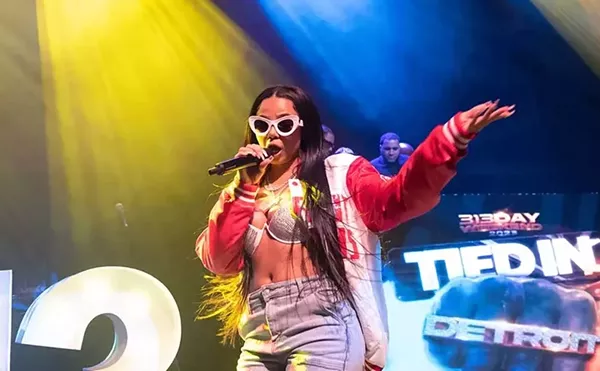There’s a loop-de-loop busyness to Dave Holland’s big band. Thelonious Monk once talked about music where something happens “every googolplexth of a second,” and Holland’s definitely got that timing down. Like some odd assortment of keys on a whistling watchman’s ring, the cool and the hot, the musta-been-planned and the gotta-be-improvised, the simple declarations and the long-winded arguments all jiggle and jangle against one another.
The rhythm section alone is a whirligig of activity. Holland makes rapid-fire bass lines seem deceptively cool, except when he specifically wants to let underlying flames show; vibraphonist Steve Nelson can come off even cooler, chilling before letting loose a shimmering sound burst. Then there’s drummer Billy Kilson, who, if sold as a wind-up toy, would have a name like Mr. Bash-o-Matic.
The big band then adds 10 horns — two of them, trombonist Robin Eubanks and saxophonist Chris Potter, from Holland’s striking and lauded quintet. More than a mass of sound, the 13-strong ensemble suggests endless motion, exponential possibilities.
“Every night I’m able to hear some of my favorite musicians stretch themselves to the limit of their creative ideas,” Holland said in a phone interview the other day from his home in New York’s Hudson Valley.
In contrast to music where so much happens at once, Holland describes his own career as so many simple steps taken when the time seemed right: “I do things because they’re compelling rather than because they’re the thing to do.”
Still a teenager in 1968, he was drafted from the London jazz scene to join Miles Davis just as he left acoustic jazz (playing “Round Midnight” in clubs) to lead the jazz-rock revolution (blasting “Bitches Brew” at concert halls ).
In the ’70s, Holland worked extensively with two pillars of the acoustic avant-garde — the structure-obsessed Anthony Braxton and the free-spirited Sam Rivers — whose musical twains met on only a couple of Holland-led gigs and his one-of-a-kind Conference of the Birds session. Despite ample opportunities, Holland delayed forming his own group for more than a decade. “There wasn’t anybody else that I wanted to play with as much as with those guys,” he said. Meanwhile, Holland worked on other projects from bass duets to the trio Gateway and spent a year accompanying singer Betty Carter.
Each of the leaders Holland worked with imparted lessons, he said.
Miles: “The idea of trying to create a music that has enough direction, but also enough freedom and openness, that the musicians can reach their own creative heights.”
Braxton: “He just kept on saying to me, ‘You’ve got to insist, you’ve got to insist.’ As an artist, you’ve got a lot of self-doubt, especially in the beginning. Does this mean anything? Is this irrelevant? Am I crazy? … Create your own reality, he was saying to me with those couple words.”
Rivers: “Sam just said to me, ‘Play all the music. … Bring everything with you to the stage, all your experiences, lay them all out.’”
Carter: “She’d put on her stage clothes, and she’d come out there, and she would put us all to shame with the energy that she put out.”
In 1982, Holland got his first quintet off the ground; with just one personnel change, the current quintet has held for the last six years. With it he’s found that enviable combination of satisfying music, critical success and steady work. And the point of the big band is to avoid the downside of bigness, to keep the punch and excitement of the small group while adding eight horns for each concert’s second half.
“Somebody asked me just the other day what would I choose for an all-star group,” said Holland. “Actually, right now, I’d choose the band I’m playing with, especially the quintet. These guys are the ones — I can reach the things I want to reach musically.”
The Dave Holland Quintet and New York Big Band perform Sat., Feb. 15, at the Michigan Theater, 603 E. Liberty, Ann Arbor. Call 734-764-2538.
W. Kim Heron is the Metro Times managing editor. E-mail [email protected].





